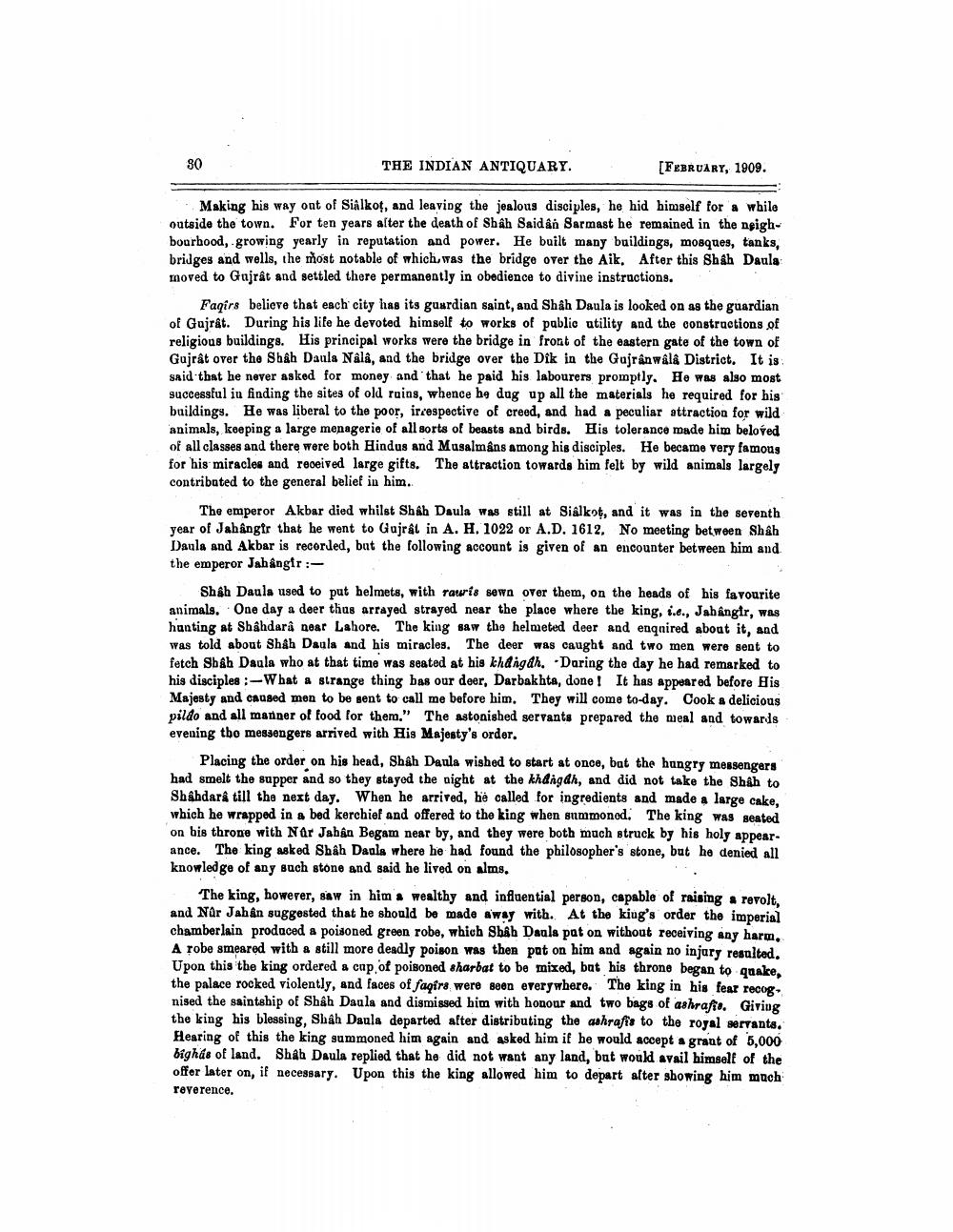________________
30
THE INDIAN ANTIQUARY.
[FEBRUARY, 1909.
· Making his way out of Sialkot, and leaving the jealous disciples, he hid himself for a while outside the town. For ten years alter the death of Shâh Saidán Sarmast he remained in the neighbourhood, -growing yearly in reputation and power. He built many buildings, mosques, tanks, bridges and wells, the most notable of which was the bridge over the Aik. After this Shah Daula moved to Gujrât and settled there permanently in obedience to divine instructions.
Faqirs believe that each city has its guardian saint, and Shâh Daula is looked on as the guardian of Gujrat. During his life he devoted himself to works of pablic utility and the constructions of religious buildings. His principal works were the bridge in front of the eastern gate of the town of Gujrât over the Shah Daula Nalâ, and the bridge over the Dik in the Gajranwala District. It is said that he never asked for money and that he paid his labourers promptly. He was also most successful in finding the sites of old rains, whence he dug up all the materials he required for his buildings. He was liberal to the poor, irrespective of creed, and had a peculiar attraction for wild animals, keeping a large menagerie of all sorts of beasts and birds. His tolerance made him beloved of all classes and there were both Hindus and Musalmans among his disciples. He became very famous for his miracles and received large gifts. The attraction towards him felt by wild animals largely contributed to the general belief in him.
The emperor Akbar diod whilst Shah Daula was still at Sialkot, and it was in the seventh year of Jahangir that he went to Gujrat in A. H. 1022 or A.D. 1612. No meeting between Shah Daula and Akbar is recorded, but the following account is given of an encounter between him and the emperor Jahangir :
Shah Daula used to put helmets, with rauris sewn over them, on the heads of his favourite animals. One day a deer thus arrayed strayed near the place where the king, i.e., Jahangir, was hanting at Shahdara near Lahore. The king saw the helmeted deer and enqnired about it, and was told about Shah Daula and his miracles. The deer was caught and two men were sent to fetch Shah Daula who at that time was seated at his khangdh. During the day he had remarked to his disciples :- What a strange thing bas our deer, Darbakhta, done! It has appeared before His Majesty and caused men to be sent to call me before him. They will come to-day. Cook a delicious pildo and all manner of food for them." The astonished servants prepared the meal and towards evening the messengers arrived with His Majesty's order.
Placing the order on his head, Shah Daula wished to start at once, but the hungry messengers had smelt the supper and so they stayed the night at the khdigdh, and did not take the Shah to Shahdara till the next day. When he arrived, he called for ingredients and made a large cake, which he wrapped in a bed kerchief and offered to the king when summoned. The king was seated on his throne with Nor Jahan Begam near by, and they were both much struck by his holy appear. ance. The king asked Shah Daula where he had found the philosopher's stone, but he denied all knowledge of any such stone and said he lived on alms.
The king, however, saw in him a wealthy and influential person, capable of raising a revolt, and När Jahan suggested that he should be made away with. At the kiug's order the imperial chamberlain produced a poisoned green robe, which Shah Daula pat on without receiving any harm, A robe smeared with a still more deadly poison was then put on him and again no injary resulted. Upon this the king ordered a cap. of poisoned sharbat to be mixed, but his throne began to quake, the palace rocked violently, and faces of faqirs were seen everywhere. The king in his fear recog, nised the saintship of Shah Daula and dismissed him with honour and two bags of ashrafio. Giving the king his blessing, Shah Daula departed after distributing the ashrafis to the royal servants. Hearing of this the king summoned him again and asked him if he would accept a grant of 5,000 bighas of land. Shah Daula replied that he did not want any land, but would avail himself of the offor later on, if necessary. Upon this the king allowed him to depart after showing him much reverence.




